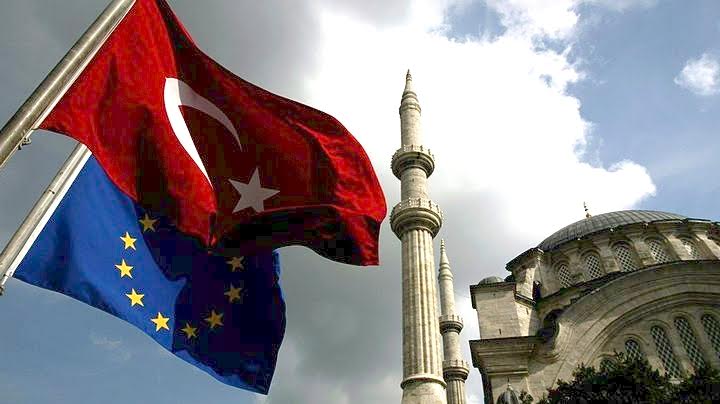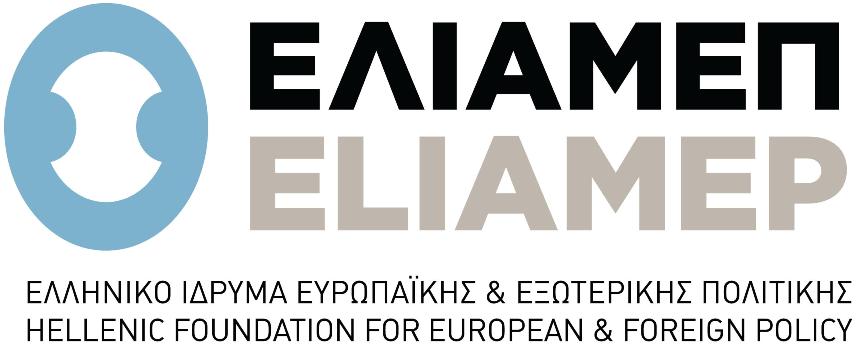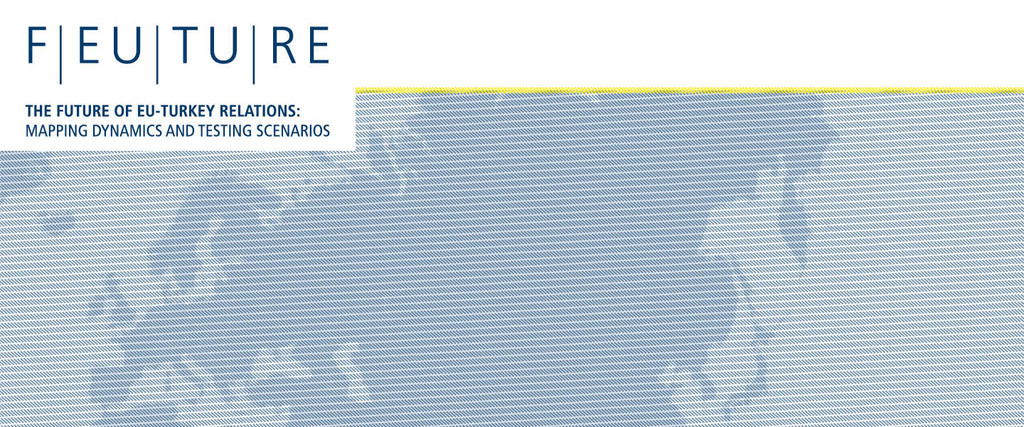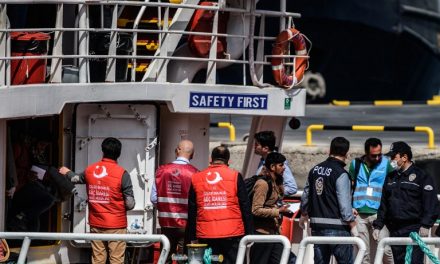The EU and Turkey face mounting challenges both in relation to one another and internationally. Turkish EU membership is a highly contested issue in the individual EU Member States. The FEUTURE research project, based at the University of Cologne and consisting of 13 renowned universities and think tanks from the EU, Turkey and the neighbourhood, analyses and reflects these variances of the national debates in the “EU 28 Country Reports”. The general aim of these reports is to provide in depth information on the EU’s perception of EU-Turkey relations in all 28 EU Member States.
Hellenic Foundation for European & Foreign Policy‘s analysts Panagiota Manoli and Thanos Dokos – with the contibution of Angeliki Dimitriadi and Theodore Tsakiris – wrote Greece’s Report analysing the Greek perspective of relations between the EU and Turkey:
History of EU-Turkey Relations
Trapped by history (Ottoman occupation, irredentist wars in the 19th and early 20th century), by more recent disputes in the Aegean Sea and by the Cyprus problem, Greece and Turkey would often find themselves in various international fora undermining one another under a zero-sum-game logic.
In spite of, or perhaps because of, the Imia (1996), S-300 (1997-98) and Öcalan (1999) crises, a period of step-by-step reconciliation started in the spring of 1999 under the leadership of the then foreign ministers of Greece and Turkey, George Papandreou and Ismail Cem respectively. Since the 1999 Helsinki Summit, Greece became one of the strongest advocates of Turkey’s EU membership and this remains its official position, despite the negative developments of the past few years. However, despite the intensification of bilateral diplomatic contacts and the so-called “socialization” policy of Greece none of the bilateral problems have been resolved, and therefore conditions of “controlled tension” were maintained.
Throughout the period of financial crisis in Greece which started in 2009 and peeked in 2015 and brought into power new political parties and elites, the support of Athens to Ankara’s EU membership effort did not diminish. On the contrary, despite the serious problems and obstacles, the Europeanization of Turkey is still considered by Greek political elites as the most effective path for solving the persisting security dilemma.
Bilateral relations deteriorated after the failed coup attempt in Turkey on 15 July 2016. The Greek Supreme Court rejected the extradition of eight Turkish officers that sought refuge in Greece after the coup attempt, on the grounds that a fair trial was not guaranteed if they were returned to Turkey. The court’s decision in January 2017, inexplicably interpreted by Turkey as a “political decision”, was followed by Ankara’s thinly-veiled threats alluding to the danger for a grave “accident” in the Aegean and the cancellation of the bilateral readmission agreement with Greece, as well as a series of provocative actions.
Prioritizing rule of law and security
A permanent parameter in the Greek debate on EU-Turkey relations defining a precondition for Turkey’s EU accession has been the rule of law and the respect for human rights. This includes minority and religious rights that are also linked to the status of the Greek Ecumenical Patriarch.
“Hard” security and “high politics” issues have also dominated the policy debate. Athens’ firm position is that without the peaceful resolution of bilateral disputes in compliance with international law, EU’s doors will remain closed to Turkey. The Cyprus problem has also occupied a central position in Greek-Turkish bilateral relations for the past sixty years. The Greek view is that a full normalization of bilateral relations and Turkey’s EU accession without solving the Cyprus problem would be all but impossible.
Although bilateral security problems and the Cyprus issue have constantly been at the top of the Greek debate on EU-Turkey relations, issues such as energy and economic cooperation have increasingly entered the Greek discourse since 1999 but have not brought about a breakthrough.
Migration
Migration, one of the key areas for EU-Turkey relations since 2015, had already been a critical issue of the bilateral Greek-Turkish agenda in the last decade. The conclusion of the bilateral Greece-Turkey Readmission Agreement in 2002, well before the current EU–Turkey Statement on Migration of March 2016, is indicative of the importance of the migration dimension. However, this agreement remained de facto inactive for years. The focus has mostly been on border controls and reducing irregular migratory flows from Turkey to Greece through its maritime and land borders. Greece, as one of the key external borders of the EU, has been faced with the challenge of representing an entry point for irregular migrants, including asylum seekers who transit through Turkey.
“Pacta sunt servanda” in Turkey’s EU accession
There is agreement across political and ideological lines in Greek political elites that Turkey is the most important security threat to Greece. However, views among political parties on how to address this threat vary. There are differences across the political spectrum over EU-Turkey relations as well.
 With the Socialist Party (PASOK) in government from the mid-1990s to the early 2000s, there was a significant change in Greek policy towards Turkey. On 6 March 1995, Greece lifted its veto against the Turkey-EU Customs Union agreement and the release of the Fourth Additional Protocol funds. Since then, the Socialist Party has been steadily arguing for Turkey’s European perspective. The conservative New Democracy party (which took power in March 2004) built on the same strategy in supporting Turkey’s accession to the EU, although with a little less zeal. The two partners in the current coalition government, SYRIZA and ANEL, view somewhat differently Turkey’s European orientation. SYRIZA while in government has steadily supported Turkey’s EU accession. In the past however, as an opposition party it questioned the benefits of Greece’s support towards Turkey’s accession arguing that there has been no real improvement in the domestic situation in Turkey, regarding among other things freedom of speech and religious rights, as well as in Greek-Turkish relations. ANEL as member of the coalition government (since January 2015) has followed the national strategy of support to Turkey’s European perspective. However, at the same time on various occasions they have stressed that Turkey cannot be considered as a member of the European family. Euroscepticism in both SYRIZA and ANEL is also high, thereby questioning the overall impact of Europeanization as a whole.
With the Socialist Party (PASOK) in government from the mid-1990s to the early 2000s, there was a significant change in Greek policy towards Turkey. On 6 March 1995, Greece lifted its veto against the Turkey-EU Customs Union agreement and the release of the Fourth Additional Protocol funds. Since then, the Socialist Party has been steadily arguing for Turkey’s European perspective. The conservative New Democracy party (which took power in March 2004) built on the same strategy in supporting Turkey’s accession to the EU, although with a little less zeal. The two partners in the current coalition government, SYRIZA and ANEL, view somewhat differently Turkey’s European orientation. SYRIZA while in government has steadily supported Turkey’s EU accession. In the past however, as an opposition party it questioned the benefits of Greece’s support towards Turkey’s accession arguing that there has been no real improvement in the domestic situation in Turkey, regarding among other things freedom of speech and religious rights, as well as in Greek-Turkish relations. ANEL as member of the coalition government (since January 2015) has followed the national strategy of support to Turkey’s European perspective. However, at the same time on various occasions they have stressed that Turkey cannot be considered as a member of the European family. Euroscepticism in both SYRIZA and ANEL is also high, thereby questioning the overall impact of Europeanization as a whole.
An ‘all or nothing’ approach
No model of a “special relationship” between Turkey and the EU would be supported by Athens. Options other than full membership would cancel the strategic rationale of Greece’s engagement with Turkey. A privileged or strategic partnership would revive bilateral tensions and would impede progress on key issues for Athens linked to EU-Turkey relations such as human rights, the rule of law and good neighbourly relations (including the settlement of any Aegean disputes).
Greece and EU-Turkey relations in 2016-2017 and future perspectives
The authoritarian turn under Erdoğan’s rule (especially after the failed coup of July 2016) has provided arguments to those in Greece, especially among the public opinion, who claim that Turkey is not a mature democracy and should not become an EU member in the foreseeable future, if ever.
The “refugee/migration crisis” was at the forefront of the discussion in Greece both regarding bilateral relations with Turkey and EU-Turkey relations. There were 860 000 irregular arrivals through the Greek maritime borders in 2015, with another roughly 204 820 in 2016. This was largely but not exclusively attributed to the overwhelming influx of Syrian refugees in Turkey. It was also interpreted by some politicians and analysts as part of Turkey’s foreign policy to put pressure on the EU through the “destabilization” of the external borders (namely Greece’s) as well as an exploitation of Turkey’s position as a transit country in order to re-energize the visa liberalization process.
The continuous threat by the Turkish government that the EU-Turkey Statement of March 2016 hinges on good cooperation with the EU, and especially visa liberalization for Turkish citizens, resulted in repeated calls within Greece to strengthen the Statement and EU-Turkish cooperation
In the field of energy, apart from the frictions over the development of East Mediterranean hydrocarbon resources and their relation with the resolution of the Cyprus question that continued in 2015/16, the most important policy development of the past months has been the potential emergence of Greek-Turkish cooperation on a pro-Russian project: the extension of the second phase of the Turkish Stream pipeline system to Greece and via Greece to Italy through either the second phase of the TAP project or the previously defunct IGI/Poseidon gas pipeline project.
Recent conflicts and political developments in the Eastern Neighbourhood have not changed Greece’s views on Turkey’s role and its relations with the EU. Turkey’s credibility as a strategic partner for the EU has been traditionally questioned. Turkey’s role in the implementation of the Eastern Partnership is perceived as being very limited as this policy is mainly a tool of developing bilateral relations between the EU and the Eastern partners and advancing the rule of law and good governance. There is, however, potential of cooperation on sectors such as energy (as Turkey is becoming an important transit country for energy supplies, especially from the Caspian Sea to the EU) and transport (improvement of sea routes, railways and highways in the Eastern neighbourhood) and on the implementation of Black Sea Synergy policy which has been nearly abandoned out of lack of political support and interest. The materialization of a Greek-Turkish pipeline to carry Russian gas in the form of Greek Stream would improve the standing of both countries as transit states enhancing EU’s security of energy transit and alleviate Greek concerns that a Turkish success in terms of pipeline diplomacy would make Turkey less willing to conform with EU accession requirements.
Even though the potential of cooperation is there, the experience of the last few years indicates that due to Turkey’s troubled relations with most of the neighbouring countries and due to its own very slow Europeanization process, Ankara’s added value to the implementation of EU’s neighbourhood policy is perceived to be rather limited. Turkey does not constitute a model of a modernizing Muslim country anymore.
It should also be mentioned that the resolution of the Cyprus problem would have a very positive effect in both bilateral and EU-Turkish relations which would be boosted, and it would improve sub-regional stability and cooperation in the Eastern Mediterranean.

N.N.














